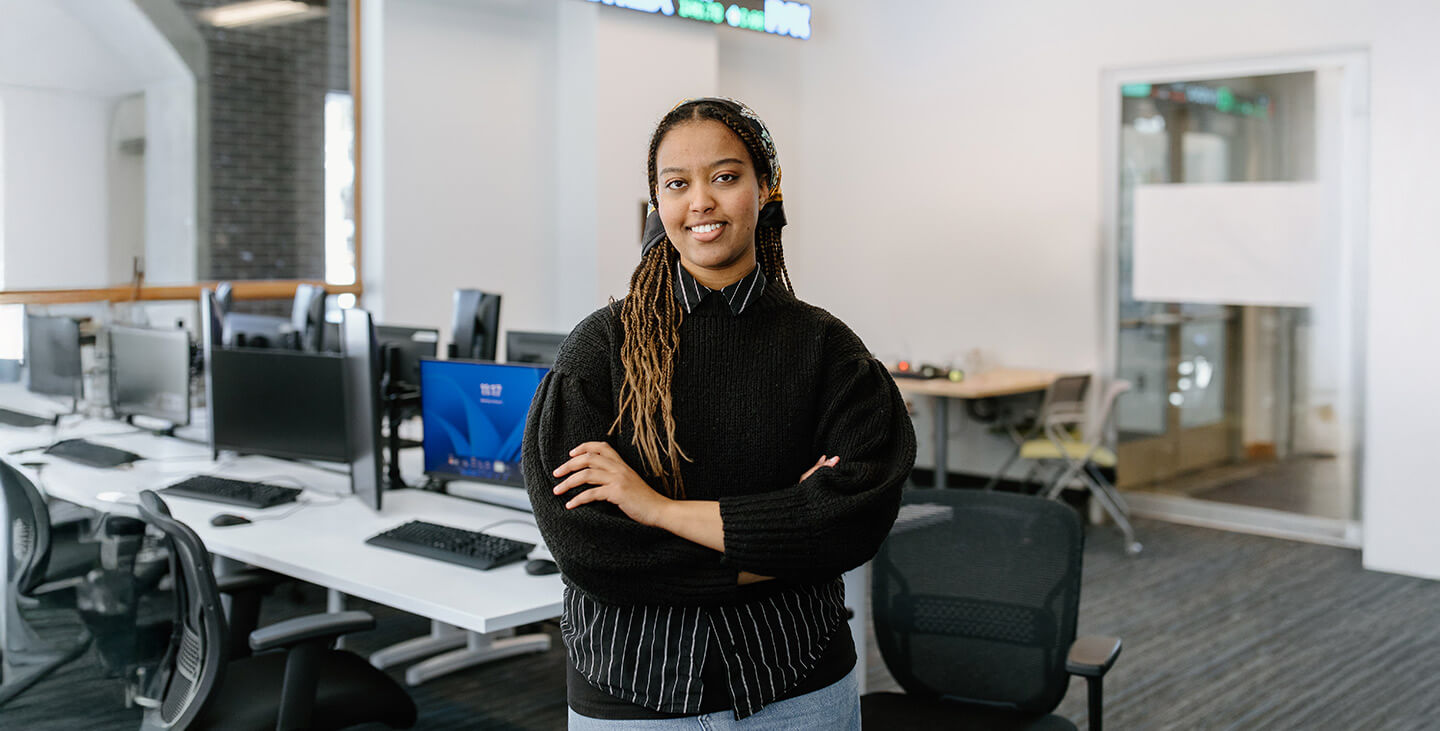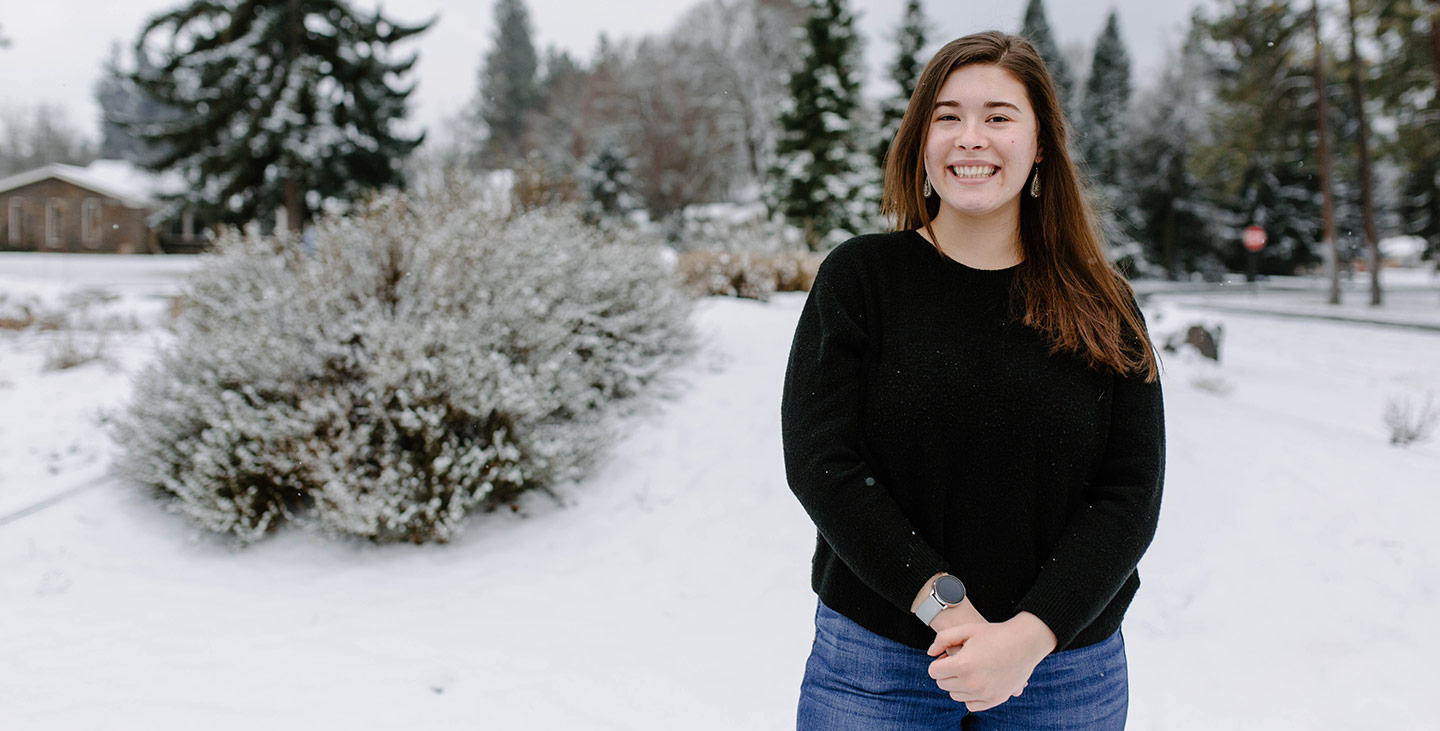Economics
 Deborah Teressa '25
Deborah Teressa '25
Why did you decide to study economics?
I chose to study economics because it bridges business insight with technical analysis, offering both practical and analytical skills. This dual perspective equips me to understand complex economic systems and make data-driven decisions.
What class has been your favorite so far?
Forecasting in Economics & Finance has been my favorite class. It has provided valuable insights into applying theoretical models to real-world data and has challenged me to collaborate effectively while overcoming technical challenges independently.
Tell us about a unique experience you've had or project you've worked on for your major.
I collaborated on a research project analyzing the impact of interest rates on economic growth, using regression models to assess relationships between macroeconomic variables. This hands-on experience deepened my understanding of how data informs economic policy and investment strategies.
What advice would you give to someone thinking about majoring in economics?
Stay curious and proactive in applying economic concepts to real-world issues. Engage with data analysis early, and don't hesitate to seek help from professors – economics is as much about critical thinking as it is about understanding numbers.
What's your dream job?
My dream job is any role that allows me to apply the skills I've developed through both formal and informal education, as well as hands-on experience. I value opportunities where I can continuously learn, grow and make meaningful contributions.
Who are three people who have made a difference for you at Whitworth?
Professor and Coach Dr. Mike Ingram, director of the Whitworth University forensics team, has been an inspiring mentor. His guidance has sharpened my communication skills and taught me the value of strategic and critical thinking.
Jerusha Emerson, my first writing professor, fundamentally shaped how I construct arguments. She emphasized that every strong argument must acknowledge and thoughtfully engage with counterarguments, which has strengthened my analytical writing.
Professor Kent Jones from the math & computer science department has genuinely taken me under his wing. His mentorship has been deeply impactful, offering academic guidance in and outside of classrooms that has helped me grow as a student and individual.
What's something that surprised you about your major?
I was surprised by how easy it is to form meaningful connections with classmates. The class sizes are small enough to feel personal yet large enough to encourage engaging and thought-provoking discussions.
Why did you choose to attend Whitworth?
I was drawn to Whitworth for its strong sense of community, commitment to meaningful values, and its ideal location that fosters both academic and personal growth throughout the four seasons.
How would you describe Whitworth?
Whitworth is an interconnected community where students have the opportunity to build meaningful relationships and engage in deeper, purposeful conversations.
 Gracey Jo Gonzalez '22
Gracey Jo Gonzalez '22
Why did you decide to study economics?
I came into Whitworth initially as a finance and English student. I'm incredibly passionate about people and I really enjoy numbers, data and writing, so I thought pursuing these two fields would combine those well. In the spring semester of my first year, I took Principles of Microeconomics with Robin Henager, and that changed everything for me. Robin, who is also my advisor, was able to show that with economics alone, I could work with people and understand what motivates them to make many of their financial decisions. Economics is a social science that seeks to understand how individuals and businesses make choices about allocating their resources. In many ways, it feels like the psychology of the business world, which I've really enjoyed.
What are some of your favorite classes so far?
Principles of Microeconomics was such a pivotal class for me, so for that reason it will always be one of my very favorites. Just this past fall semester though, I took Econometrics (also with Robin Henager), and that class was incredibly fascinating and it pushed me in so many ways. This class allowed us to use data and numbers to describe economic systems and find correlations between things that pertain to the human condition and economic models and systems. It was more data application than I was used to, but I loved being able to use and apply new skills that we learned every week in class.
Tell us about a unique experience or project you've worked on for your major.
The most unique project I've worked on was during my Econometrics class. Throughout the semester, my group and I worked to try to understand the relationship between GDP and suicide rates throughout the United States for the years 2014-2018. Though it's a heavy topic, we wanted to see what the impact of economic and financial variables had on something so personal, like suicide, though we knew they would never be able to explain the whole picture or problem. Interestingly enough, many of our assumptions were refuted by data. This project allowed us to really go deep in data application and understand such personal matters through an economic lens. Knowing that this kind of research is possible makes economics as a discipline that much more applicable and valuable to know and understand.
What advice would you give to someone thinking about majoring in economics?
Economics is such a versatile field of study, because not only does it prompt us to look at economic and financial variables closely, but it also allows us to understand people and businesses as a whole, and what their financial inclinations are and why. Business as a whole can feel kind of daunting, but knowing that economics is a social science has made it more enjoyable for me to grasp and easier for me to relate to. It never hurts to understand a bit more about the complicated nature of our economy and how individuals and businesses allocate their resources! Plus, our own university president, Beck Taylor, was a professor of economics and even taught one class for my Econometrics course, so that's a huge bonus!
What's your dream job?
I have loved and wanted to do so many different things in my life. I find that my dream job often changes as I grow and experience new things. As a 21-year-old, this can feel both liberating and frustrating, because I'd love the reassurance that a sure-fire career could give me, but I am grateful that the world feels wide open. Right now, I've got my sights set on working in the nonprofit world, because I'd like to be able to combine my passion for people with my love of economics, and it's the kind of work that makes my heart start beating a bit quicker, and I think it would be so fulfilling and rewarding.
Who has been an important connection for you at Whitworth, and why?
Like so many others might say as well, I genuinely have so many important connections and relationships that I've made here at Whitworth. As a student, I think of my advisor and professor, Robin Henager, and all the times she's answered my many, many questions so gracefully and patiently and has pushed and motivated me in the best possible ways. She has fostered my love for economics and made me feel seen in the classroom. I think of Addie Grow in the School of Business as well, and how thankful I am for her investment in my future and willingness to help me in my career, while also just being one of the most amazing ladies ever. As an assistant area coordinator for residence life on campus, I think of my awesome supervisor, Phillip Allevato, who has for the past two years encouraged my growth as an individual and has created some of the most memorable, fun spaces for me in my experience as a college student. My community of people here at Whitworth will forever be my favorite part of my college experience, and they've undoubtedly made all of the hardships that come with college and life in my early 20s worth it.
Why did you choose to attend Whitworth?
I had my sights set on a multitude of small, Christian colleges, because I knew I'd thrive in spaces where I could get to know professors better and where I'd feel I had the most community. Honestly, it was my mom's push for me to come here that solidified it. There were so many big decisions I had to make in my life at the time, and my mom's steady affirmation that she could just picture me at Whitworth so clearly is what made me feel fully comfortable, and excited, to commit to coming here. I'm so beyond glad I did!
How would you describe Whitworth?
Whitworth is a bustling community full of individuals that are eager to grow, learn more about themselves and the world around them, and step into independence in a place that works to foster these important experiences.
Ibiye Tam-George '22
Why did you decide to study economics?
I chose to study economics because I wanted to understand people, businesses, markets and government better. I was curious to understand how scarce resources are distributed/managed.
What are some of your favorite classes so far?
My favorite classes so far have been Principles of Macroeconomics and Principles of Microeconomics. I enjoyed these courses because professors thoroughly explained every concept and terminology with relatable examples that have made studying economics more interesting.
Tell us about a unique experience or project you've worked on for your major.
In my junior year fall semester, I took a class called International Business. This class had a project for which my group conducted research on a U.S. company of our choice and created a strategy to introduce this company to two other countries. This project particularly stuck with me because I learned about different factors to consider (for example, taxes, the income of the target market, culture, etc.) when introducing a new business. My group got the opportunity to speak with top personnel in leading companies from different countries and we visited some of these companies.
What advice would you give to someone thinking about majoring in economics?
Studying economics at Whitworth University is a promising journey. There are many resources available on campus that aid a better learning process. Professors are always committed to your growth and are available to help throughout your stay at the university.
Who has been an important connection for you at Whitworth, and why?
My advisor has been a major connection for me at Whitworth. Being in my first year and trying to figure out what classes to take, what clubs to join, and how to navigate my college experience was overwhelming at first. However, Whitworth assigned an advisor to me upon my entry and that made everything easier because she was always willing to help me, answer my questions, and suggest what she thought to be best for me.
How would you describe Whitworth?
Whitworth is a family committed to helping you become the best version of yourself. The community is welcoming, and as an international student, I have found a home in Whitworth.